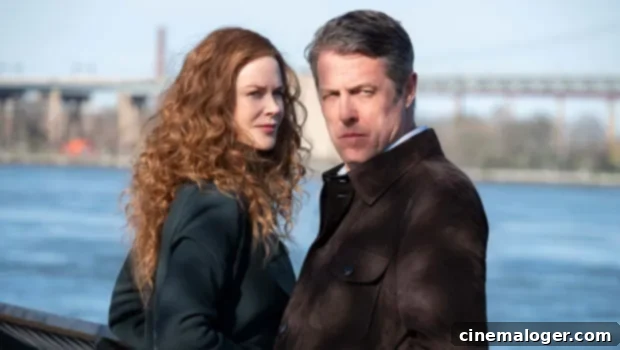The Undoing Finale: Unmasking Jonathan Fraser’s Dark Truth and Elena Alves’ Killer
The highly anticipated finale of HBO’s The Undoing delivered a cascade of shocking revelations, culminating in the dramatic unmasking of Elena Alves’ killer and the complete unraveling of the Fraser family’s meticulously crafted facade. From the very first scene, picking up directly after the penultimate episode’s cliffhanger, the tension was palpable, setting the stage for a heart-stopping conclusion that left no stone unturned in exposing the psychological depths of its characters and the corrosive power of deceit.
The episode commences with a moment of horrifying discovery. Grace Fraser, portrayed by the captivating Nicole Kidman, stumbles upon the ornate sculpting hammer in her beach house, the very weapon suspected of being used in Elena’s brutal murder. Her son, Henry, portrayed by Noah Jupe, awakens to find his mother holding the incriminating object. His confession is gut-wrenching: he found it in the outdoor fireplace shortly after their arrival at the beach house. Grace, bewildered and desperate for answers, demands to know why he withheld this critical information. Henry’s reply, delivered with a mix of fear and misguided loyalty, pierces her heart: “Because he killed her. I didn’t want him to get caught.” He harbored a secret belief that if Grace discovered the weapon, she would undeniably turn it over to the authorities, thus sealing his father, Jonathan Fraser’s, fate.
This revelation plunges the family into a desperate strategizing session, bringing together Grace, Jonathan, Henry, and their formidable defense attorney, Haley Fitzgerald. Jonathan, ever the manipulator, seizes the opportunity to spin a new narrative. He admits to having an affair with Elena, claiming they frequently used the beach house for their trysts. With calculated conviction, he suggests that Fernando, Elena’s distraught husband, might have planted the sculpting hammer to frame him. In a masterful twist of self-preservation, Jonathan even posits that the weapon could, in fact, exonerate him, deflecting suspicion and attempting to leverage his family’s trust once more.
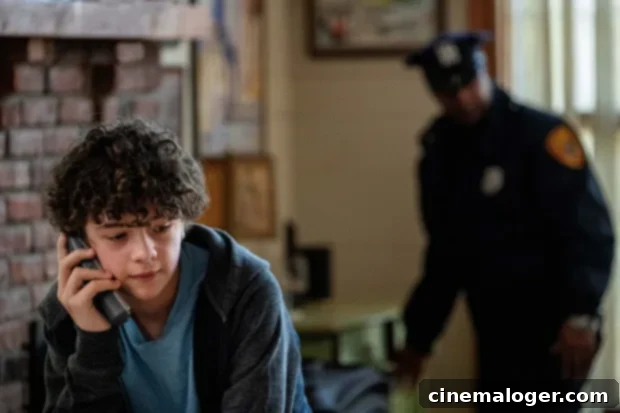
The extent of Henry’s loyalty, and his desperate attempt to protect his father, is further underscored by a grim detail: he ran the hammer through the dishwasher not once, but twice, in a futile effort to eliminate any incriminating evidence. Consequently, any potential DNA or fingerprint evidence that could have definitively linked the weapon to the killer has been thoroughly destroyed. Haley Fitzgerald, acutely aware of the perilous situation, makes it clear that if the sculpting hammer comes to light, their case is irrevocably lost. More alarmingly, she warns that Henry could face arrest for obstructing justice, unequivocally advising against turning over the weapon. The moral and legal stakes have never been higher, forcing Grace to confront the agonizing choice between protecting her son and seeking the truth.
In a private conversation, Jonathan’s manipulative nature resurfaces as he audaciously attempts to pin the blame on Henry, suggesting his own son might be responsible for the murder. Grace, already reeling from the cascade of lies, is appalled by his audacity and orders him to leave. Before his departure, Jonathan seeks out Henry in his room, attempting to soothe his son’s outrage at being accused of murder by his own father. He promises Henry their planned road trip will still happen after the trial, a desperate, transparent ploy to maintain some semblance of control and false hope.
Grace confides in her father, Franklin Reinhardt, brilliantly played by Donald Sutherland. Franklin, ever the astute observer, questions how Grace can remain so blind to Jonathan’s true character, despite the mounting evidence. Grace, her resolve hardening, acknowledges the unfolding horror. She declares that she now sees the reality of the situation and, with a steely determination, vows to fix what has been irrevocably “undone” by Jonathan’s betrayals.
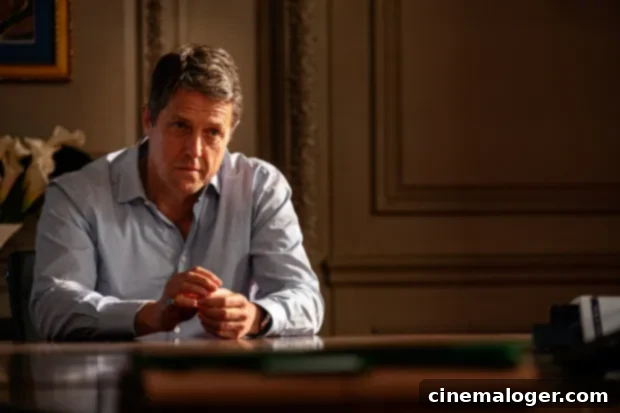
Jonathan Fraser’s Calculated Testimony and Grace’s Haunting Realization
The following day brings the climax of the courtroom drama as Jonathan Fraser, portrayed with chilling precision by Hugh Grant, takes the stand. He maintains his innocence, steadfastly asserting that he did not kill Elena Alves, but rather found her dead after they had engaged in sexual intercourse. In a calculated move designed to garner sympathy, Jonathan speaks of his emotional bond with Miguel, Elena’s son, particularly during Miguel’s battle with cancer. This carefully constructed narrative aims to portray him as a compassionate healer, a stark contrast to the brutal murderer he is accused of being. However, during cross-examination, he falters under questioning about why he failed to call the police, claiming he panicked and simply went home. It is during this testimony that Grace experiences a harrowing “flash of memory”: a vivid, horrifying image of Jonathan meticulously cleaning his bloody shirt, a pivotal moment that shatters her remaining illusions about her husband.
That night, a deeply troubled Grace talks with Henry, assuring him that her primary concern is his well-being above all else. Henry, visibly struggling under the weight of his family’s ordeal, remains withdrawn. In a critical, yet subtly orchestrated moment, Grace calls her friend Sylvia Steinetz, asking her to join her for a walk. During this conversation, Grace requests Sylvia’s help with a crucial, undisclosed task, hinting at a new strategy forming in Grace’s mind, a plan that would ultimately change the course of the trial.
The trial continues with Haley Fitzgerald calling Miguel Alves to the stand the next day. She probes him about the night of his mother’s death, questioning whether he woke up at any point. Miguel, seemingly unaware, states he doesn’t recall doing so. Haley then shifts her focus, asking about his parents, Fernando and Elena, and their arguments. Miguel candidly admits that they often fought, confessing to his teachers that their quarrels frightened him. During Miguel’s emotional testimony, Sylvia discretely exits the courtroom, heading to the bathroom where she coincidentally “runs into” the prosecutor, a seemingly innocuous encounter that will have monumental consequences.
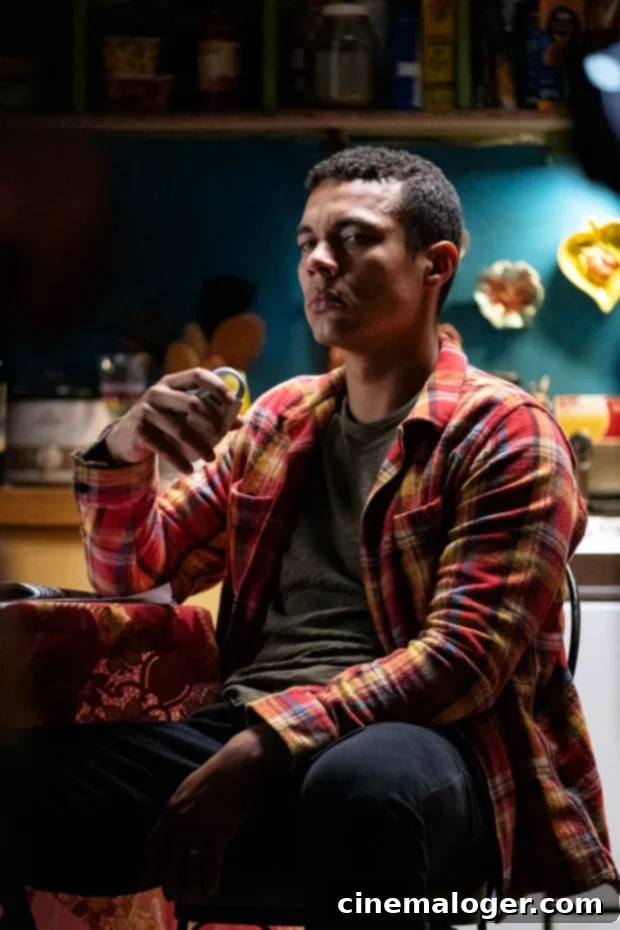
During a break in the proceedings, Fernando Alves, overcome with grief and fury, confronts Haley, Jonathan, and Grace, vehemently branding them all “vile.” Haley, ever the strategist, declares her intention to call Detective Mendoza to the stand next. However, Grace interjects, announcing her willingness to testify. With a newfound conviction, she declares she will speak her truth. Initially, she turns to Jonathan, stating, “I don’t believe you could have done this,” a statement laden with a complex mix of lingering doubt and a deeper, unspoken strategy.
Grace Fraser’s Testimony: The Ultimate Undoing
Grace Fraser then takes the stand, a pivotal moment that ignites the series’ most dramatic twists. Under direct examination by Haley, Grace initially paints a portrait of Jonathan as a compassionate healer, a man dedicated to saving lives, someone she has never witnessed being violent. She describes him as a “gentle man” and a “man of empathy,” meticulously constructing an image designed to counter the prosecution’s portrayal of a ruthless murderer. Her words, though seemingly supportive of Jonathan, are delivered with an underlying tension that hints at a deeper game at play, a calculated risk that will either exonerate her husband or expose him completely.
However, it is during the cross-examination that the carefully constructed facade begins to crack, and the trial takes a shocking turn. The prosecutor, armed with devastating information, relentlessly presses Grace on her earlier claims of Jonathan’s non-violent nature. She brings up the harrowing incident at the beach house, where Jonathan had violently grabbed Grace by the neck. Grace, initially attempting to defend him, insisting it was an isolated incident, finds herself cornered by the prosecutor’s relentless probing. The prosecutor directly asks Grace to recount what she told Detective Mendoza about the event. Under immense pressure, Grace reluctantly admits she was “terrified in the moment” and was “startled” by Jonathan’s aggression.
The prosecutor then plays the chilling 911 call from that very night, forcing Grace to confront the undeniable evidence of Jonathan’s volatile temper. The prosecutor, seeing an opening, then masterfully forces Grace’s hand, compelling her to speak about Jonathan’s little sister. Grace, visibly distressed but resolute, reveals a recent conversation she had with Jonathan’s mother. The prosecutor, seizing the moment, asks Grace to disclose what Jonathan’s mother said about his reaction to his sister’s death. In a breathtaking moment that silences the courtroom and sends shockwaves through Jonathan, Grace delivers the ultimate blow: she reveals that Jonathan’s mother told her he suffered “neither guilt nor grief” over his sister’s death, adding that Jonathan “doesn’t know how to suffer or show remorse.” This devastating testimony exposes Jonathan’s inherent psychopathy, revealing a fundamental lack of empathy that irrevocably shatters any remaining doubt about his capacity for violence and murder.
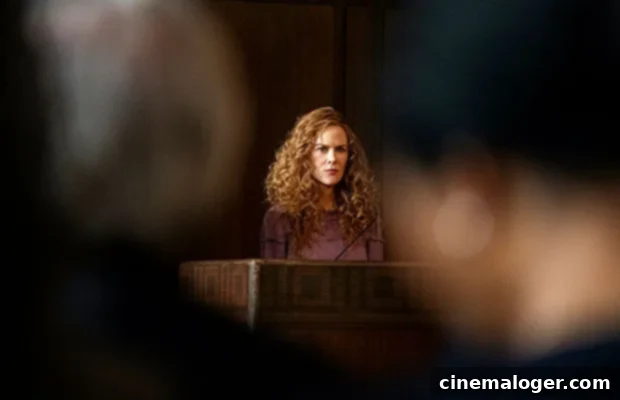
The revelation about Jonathan’s sister, a previously unknown and deeply disturbing facet of his past, came directly from Grace’s earlier, seemingly casual walk with Sylvia. During that critical conversation, Grace had confided in Sylvia about the sister. When Sylvia later “ran into” the prosecutor in the bathroom, it becomes clear she had discreetly provided a crucial hint about this deeply buried family secret, enabling the prosecutor to exploit it during Grace’s cross-examination. This carefully orchestrated maneuver highlights Grace’s profound determination to uncover and expose the truth, regardless of the personal cost.
The Aftermath and Jonathan’s Desperate Escape
The courtroom erupts into chaos. Haley Fitzgerald is visibly distraught, her defense strategy crumbling before her eyes. Jonathan, utterly shocked and betrayed, stands up and vehemently declares Grace a liar. As Grace steps off the stand, she locks eyes with Jonathan, a silent, powerful gaze of defiance and bitter resignation. Sylvia, demonstrating unwavering loyalty, immediately rushes to Grace’s side, walking her out of the courthouse. Haley, recognizing the irreparable damage, announces her intention to move for a mistrial. Jonathan, still attempting to shift blame, points an accusatory finger at Grace for sabotaging his defense. Haley, however, delivers a scathing retort, reminding him that this catastrophic turn of events is entirely his fault for not disposing of the sculpting hammer. “How stupid can you get?” she asks him, her voice dripping with incredulous contempt, perfectly encapsulating the sheer ineptitude and arrogance of Jonathan’s actions.
Later, Jonathan texts Henry, expressing a manipulative longing and inviting him to breakfast the following morning. The next day, as Grace and Franklin arrive at the courthouse, Grace receives a terrifying text notification: Henry has not shown up at school. Panic sets in as they realize Jonathan has abducted their son, taking him on a desperate drive, a final, terrifying attempt to escape justice and cling to his family, even if it meant tearing them apart.
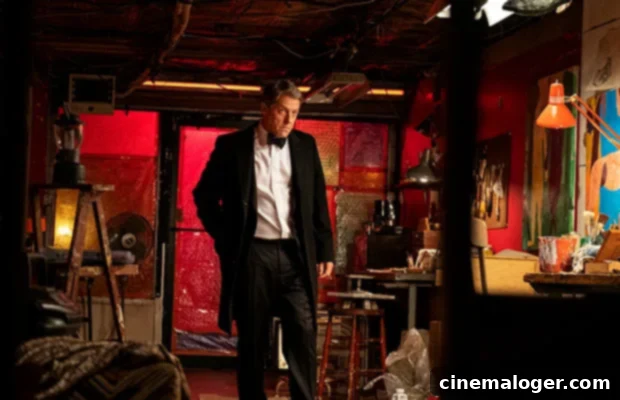
The Horrific Truth: Jonathan Fraser is Elena Alves’ Killer
The finale finally delivers the chilling flashback of the murder night, revealing Jonathan Fraser as Elena Alves’ killer all along. Jonathan had gone to visit Elena at her art studio, and after their sexual encounter, just as he had testified, Elena began to talk. She spoke of Grace’s unexpected kindness towards her recently and, more disturbingly to Jonathan, expressed her belief that Henry could be a wonderful, older brother figure for Miguel. It was this suggestion, this perceived threat to his carefully guarded family unit, that triggered Jonathan’s psychopathic rage. He coldly warned Elena to stay away from his family. Elena, defiant and perhaps underestimating the depths of his depravity, retorted, “You will never hurt me. You will never leave me.” In a brutal fit of uncontrolled fury, when Elena refused to believe his threats, Jonathan violently slammed her head against the wall multiple times. “I just left you,” he hissed, before throwing her keys away. Elena, desperate and fighting for her life, grabbed the sculpting hammer and attempted to strike Jonathan. He quickly wrestled it from her, then delivered a single, devastating blow. As Elena lay unconscious, Jonathan, devoid of any remorse or hesitation, closed her eyes and continued to bludgeon her to death. Jonathan Fraser killed Elena Alves in a cold, calculated act of violence, fueled by his narcissistic need for control and utter lack of empathy.
The Climax: A Desperate Chase and Final Confrontation
During his frantic drive with Henry, Jonathan’s demeanor becomes increasingly erratic and unhinged. He cannot fathom that this murder will be his legacy, clinging to the delusional belief that there is still a way out of his predicament. “You murdered a person,” Henry cries, his young voice trembling with terror, fully comprehending the monstrous truth about his father. As police sirens wail in the distance, closing in, Henry desperately begs his father to stop and let him out of the car. Jonathan, ignoring his son’s pleas, speeds dangerously towards a red light, narrowly missing a tractor-trailer. He then veers over a bridge, crossing the yellow line into oncoming traffic. Another car swerves violently to avoid a collision, highlighting Jonathan’s reckless disregard for anyone’s life, including his son’s. Finally, he abruptly stops the car and climbs out, scaling the bridge’s railing, preparing to jump to his death in a desperate, final act of self-pity and escape.
In a heart-wrenching moment, Henry, despite his fear, rushes forward and grabs his father’s hand, pleading with him not to jump. Just then, Grace, having arrived by helicopter, races out and runs towards them, screaming both their names, a desperate cry of a mother trying to save her son and confront the monster she married. Jonathan, momentarily halted by Henry’s desperate grasp and Grace’s arrival, steps down from the perilous bridge ledge. Grace, without a moment’s hesitation, pulls Henry into a protective embrace. Jonathan, expecting a comforting hug, is met with the stark reality of his wife’s revulsion. Grace, holding Henry tightly, turns and runs, fleeing from the man who was once her husband, but is now revealed as a terrifying, irredeemable monster. Jonathan Fraser is finally arrested for the murder of Elena Alves, his reign of deception utterly undone, leaving Grace and Henry to begin the painful journey of rebuilding their lives from the ashes of his monstrous lies.
